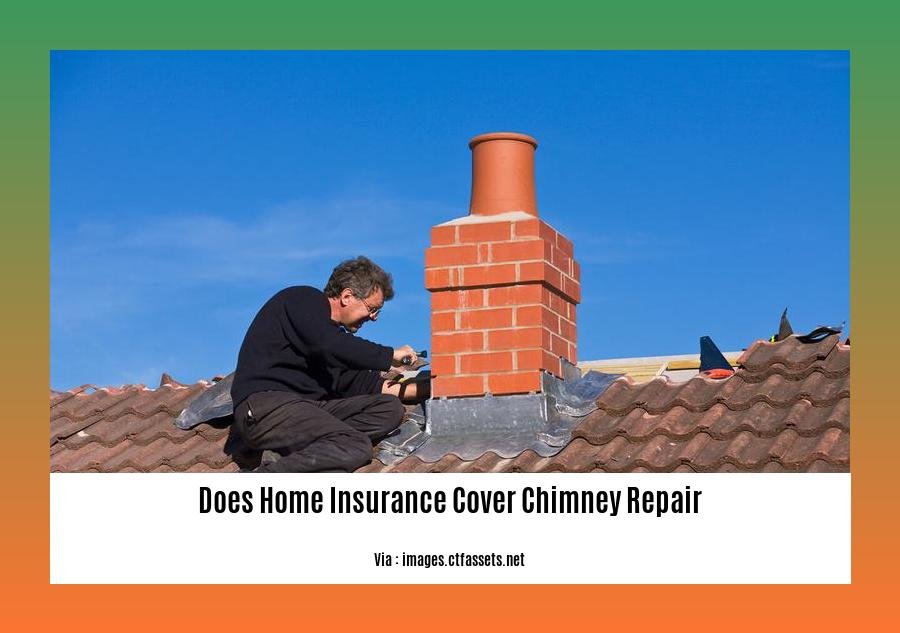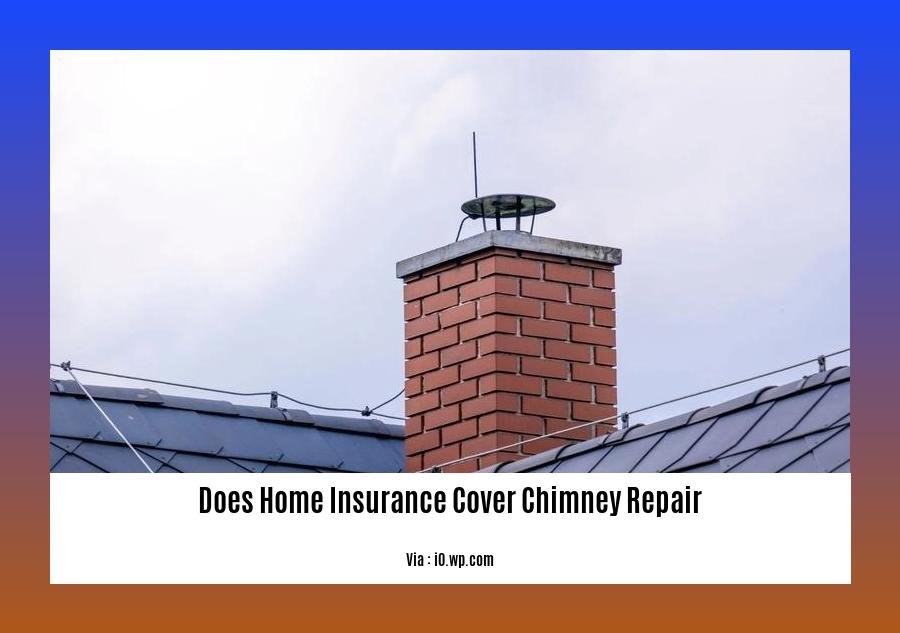Discover the ins and outs of home insurance coverage for chimney repair in our comprehensive guide, [Does Home Insurance Cover Chimney Repair: Navigating Insurance Policies for Chimney Damage]. Learn how to understand your policy, identify covered perils, and navigate the claims process to ensure your chimney is protected.
Key Takeaways:
-
Homeowners insurance covers chimney repairs if the damage is caused by an insured event, such as fire, lightning strike, or windstorm.
-
Normal wear and tear, or neglecting the chimney, voids coverage.
-
Submit a claim with photos of the damage, a description of the incident, and the date of the damage.
-
Check for signs of chimney damage like cracks, loose bricks, and water stains.
-
Prevent damage with regular cleaning and yearly inspections.
-
Costs of repairs vary; minor repairs can cost a few hundred dollars, while major repairs can cost thousands.
Does Home Insurance Cover Chimney Repair:
Navigating Through Insurance Policies for Chimney Damage
Chimneys, often overlooked yet crucial components of our homes, can unexpectedly demand attention and repairs. As a homeowner, you naturally wonder if your trusty home insurance policy extends its protective umbrella to chimney mishaps. Join us as we embark on this journey, demystifying the intricacies of home insurance coverage for chimney repair.
Chimney Damage: A Tale of Covered and Excluded Perils
Understanding the scope of coverage is essential in decoding home insurance policies. Generally, damages resulting from covered perils, such as lightning strikes, fires, and windstorms, fall under the protective umbrella of insurance. Conversely, damage caused by normal wear and tear or neglect, like gradual deterioration or lack of maintenance, is often excluded.
Navigating the Claims Labyrinth for Chimney Repair
Should you find yourself facing chimney damage covered by your insurance policy, navigating the claims process becomes your next task. Document the damage thoroughly with photographs and a detailed description of the incident. These records will serve as essential evidence in your claim filing.
Spotting the Signs of Chimney Distress
Learning to recognize signs of chimney distress is akin to preventative healthcare for your home. Keep an eye out for cracks, crumbling bricks, and loose mortar. Water damage tells a tale of neglect, manifested as stains or mold on the chimney’s surface. Regular cleaning and inspections can catch these issues early, preventing costly repairs down the road.
Preventing Chimney Woes: An Ounce of Prevention
Proactive maintenance is the key to keeping your chimney in tip-top shape. Schedule annual cleanings and inspections to nip potential problems in the bud. Proper installation and regular upkeep of chimney caps and crowns are additional layers of defense against the elements.
Chimney Repair Costs: A Range of Possibilities
The financial toll of chimney repairs can vary widely, influenced by the extent of damage. Minor repairs might set you back a few hundred dollars, while major structural issues can easily climb into the thousands. Selecting a reputable contractor with experience in chimney repairs is a wise investment in the longevity of your home.
With this newfound knowledge, you’re better equipped to navigate the complexities of home insurance coverage for chimney repairs. Stay vigilant in preventing chimney damage and maintaining your home’s integrity. Should the unexpected occur, your insurance policy can offer a safety net, shielding you from the financial burden of repairs.
-
Searching to understand if home depot hire felons? We’ve created a comprehensive guide to help you navigate this exact query.
-
Want to know if home goods allow dogs? Head over to our page uncovering the store’s pet policies and guidelines.
-
Price matching woes at home hardware? Find answers to your queries and learn the nuances of their policy.
-
home insurance covers driveway damage or not? Find out the extent of coverage and the specific conditions that apply.
Exceptions or special circumstances that may offer coverage
Hey folks! Let’s dive into the world of home insurance and its coverage for chimney repair. While most policies have standard exclusions, there are a few exceptions and special circumstances that may offer coverage. Allow me to shed light on these unique situations:
Unforeseen Events:
Have you ever been struck by lightning? It’s a rare occurrence, but if it happens and causes damage to your chimney, your insurance policy might step in to cover the repair costs. Same goes for sudden and accidental fires that harm your chimney.
Value Coverage:
Let’s say you’ve had your chimney for a while, and it’s seen better days. If it’s no longer functional but in good condition, your insurance may cover its replacement cost based on its actual cash value at the time of loss.
Upgrades:
If you decide to upgrade your chimney to enhance its safety and efficiency, your insurance policy may cover the cost. This could include installing a chimney cap or lining. It’s worth checking with your insurer to confirm.
Additional Living Expenses:
Imagine if your chimney damage is so severe that you can’t stay in your home while repairs are being made. Your insurance might cover these additional living expenses, including hotel stays or temporary rental costs.
Key Takeaways:
-
Lightning strikes and sudden fires: Covered under most home insurance policies.
-
Value Coverage: Might cover replacement costs based on actual cash value.
-
Upgrades for safety and efficiency: May be covered by your insurance.
-
Additional living expenses: May be covered if you can’t stay in your home during repairs.
Sources:
Homeowners Insurance Coverage
What Does Homeowners Insurance Cover and Not Cover?
Preventive Measures Homeowners Can Take to Minimize Chimney Damage
Hey everyone! Are you aware that routine maintenance and a keen eye can save you a lot of trouble and keep your chimneys in tip-top shape? Let’s dive into some precautionary steps that can prevent costly repairs and ensure your chimney stays strong and healthy!
Key Takeaways:
- Regular maintenance and repairs ensure your chimney remains in optimal condition.
- Neglecting maintenance can lead to costly repairs and potential insurance claim denials.
- Routine inspections can catch issues before they escalate.
- Chimney caps and crowns shield chimneys from the elements.
-
A clean and clear area around the chimney prevents fire hazards and debris accumulation.
-
Embrace Regular Inspections:
Just like you take your car for regular checkups, your chimney deserves the same attention! Schedule annual or bi-annual inspections to catch minor issues before they turn into major headaches. You’ll be surprised what a trained eye can spot! -
Chimney Caps and Crowns: Your Protective Shield:
Chimney caps and crowns act as umbrellas for your chimney, shielding it from rain, snow, and debris. Their protective shield keeps water out, preventing internal damage and deterioration. -
Clean Sweep: The Art of Chimney Maintenance:
Chimneys accumulate a lot of soot and debris over time, just like your vacuum cleaner. A professional chimney sweep can remove these buildup, ensuring proper airflow and preventing chimney fires. -
Clean Surroundings Matter:
Keep the area around your chimney free of debris, leaves, and overhanging branches. This reduces fire hazards and prevents debris from accumulating in and around the chimney. -
Repairs: Don’t Delay, Address Today:
Neglecting minor chimney issues can lead to costly repairs down the road. If you notice signs of damage, such as cracks, loose bricks, or crumbling mortar, don’t delay repairs. Prompt action can save you money and ensure your chimney is safe and functional.
Remember, prevention is key! Regular maintenance, inspections, and timely repairs can save you from costly surprises and keep your chimney in top shape. Stay vigilant and proactive; your chimney will thank you for it!
Sources:
- Chimney Maintenance 101: Tips to Keep Your Chimney in Top Shape
- The Importance of Chimney Inspections and Maintenance
Tips for selecting a reliable chimney repair contractor
Hey homeowners! Chimney troubles can really put a damper on your peace of mind. But don’t worry, I’ve got your back. Let’s dive into the world of chimney repair contractors and help you pick the right one for the job.
Key Takeaways:
-
Safety and certification matter: Look for contractors certified by the Chimney Safety Institute of America (CSIA). They’ve got the skills and knowledge to fix your chimney safely and efficiently. Steer clear of those super cheap quotes, as they might compromise on quality.
-
Written contracts are your friends: When dealing with extensive repairs, get a written contract that spells out the work to be done and the warranty offered. This little piece of paper can save you a lot of headaches down the road.
-
Avoid hefty upfront payments: Stay away from contractors demanding a fortune upfront. Instead, agree on a payment schedule based on the progress of the work. This way, you’re only paying for what’s been done, fair and square.
-
Documentation is key: If you’ve got chimney damage covered by insurance, document it like a pro. Take clear photos of the damage and write down everything that happened. This documentation will make the claims process a breeze.
-
Regular check-ups are a lifesaver: Preventative maintenance is like giving your chimney a high-five. Get it inspected and cleaned regularly. This way, you can catch small problems before they turn into big, expensive ones.
Sources
- How to Choose a Reliable Chimney Sweep: 7 Tips
- 5 Tips for Hiring a Chimney Contractor
FAQ
Q1: In what scenarios is chimney repair covered by homeowners insurance?
A1: Homeowners insurance typically covers chimney repairs if the damage is a direct result of a covered loss, such as a fire, lightning strike, windstorm, or any other event outlined in your policy as being covered. Damage caused by normal wear and tear, neglect, or lack of maintenance is usually not covered.
Q2: What steps should I take to file a claim for chimney damage covered by my homeowners insurance?
A2: To file a claim for chimney damage covered by your homeowners insurance, you should first thoroughly document the damage, taking pictures and videos if possible. Afterward, contact your insurance company as soon as possible to initiate the claims process. Provide detailed information about the incident, including the cause of the damage and any supporting documentation you have gathered.
Q3: What are some common signs of chimney damage that homeowners should watch out for?
A3: Common signs of chimney damage that homeowners should be aware of include cracks, crumbling bricks or mortar, loose mortar joints, rust, and any signs of water damage such as stains, mold, or efflorescence. Additionally, a chimney that is leaning or has shifted from its original position may also indicate damage.
Q4: How often should homeowners have their chimneys cleaned and inspected to prevent damage?
A4: Regular cleaning and inspection of chimneys are crucial to prevent potential damage and ensure proper functioning. It is generally recommended that homeowners have their chimneys cleaned and inspected at least once a year, preferably before the start of the heating season. This allows for timely identification and repair of any issues before they escalate into more severe problems.
Q5: What are some preventive measures homeowners can take to minimize the risk of chimney damage?
A5: Homeowners can take proactive steps to minimize the risk of chimney damage by conducting regular maintenance and inspections. This includes having the chimney cleaned and inspected annually, removing any debris or obstructions from the chimney, and ensuring proper ventilation to prevent moisture buildup. Additionally, using dry, seasoned firewood and avoiding burning trash or plastic in the fireplace can help reduce the risk of chimney fires and damage.
Does Home Insurance Cover Chimney Repair: A Comprehensive Guide for Homeowners
Does Home Insurance Cover Chimney Repair: A Comprehensive Guide for Homeowners
Key Takeaways:
-
Home insurance covers chimney repairs for damages caused by covered losses, not normal wear and tear or neglect.
-
Covered losses include collapse under the weight of snow/ice, fire, lightning, and vandalism.
-
Non-covered losses include crown cracks and deterioration from rain/snow.
-
If chimney damage causes damage inside the house, it’s usually covered.
Does Home Insurance Cover Chimney Repair?
Chimney damage can be a costly problem for homeowners. But the good news is that most home insurance policies cover chimney repairs if the damage is caused by a covered loss.
What is Covered?
Homeowners insurance typically covers chimney repairs caused by:
-
Collapse: If your chimney collapses due to the weight of sleet, ice, or snow, your insurance will likely cover the cost of repairs.
-
Fire: If your chimney is damaged by a fire, your insurance company will cover the cost of repairing or replacing the chimney.
-
Lightning: Lightning strikes can also damage chimneys. If your chimney is damaged by lightning, your insurance should cover the cost of repairs.
-
Vandalism: If someone vandalizes your chimney, your home insurance policy will likely cover the cost of repairs.
What is Not Covered?
Homeowners insurance typically does not cover chimney repairs caused by:
-
Normal wear and tear: Home insurance policies do not cover damage caused by normal wear and tear. This means that if your chimney deteriorates over time due to rain, snow, or wind, your insurance company will not pay for repairs.
-
Neglect: If you neglect to maintain your chimney, your insurance policy will likely not cover any damage. This means that if you do not have your chimney inspected and cleaned regularly, and it is damaged as a result, you will be responsible for the cost of repairs.
-
Cracks in the crown: Cracks in the crown of your chimney are typically not covered by insurance. The crown is the top of the chimney, and it is exposed to the elements. Cracks in the crown can allow water to seep into the chimney and cause damage.
-
Deterioration of the chimney due to rain and snow: The deterioration of your chimney due to rain and snow is also not covered by homeowners insurance. This is because this type of damage is considered to be normal wear and tear.
How to File a Claim
If you believe that your chimney damage is covered by your home insurance policy, you should file a claim as soon as possible. To file a claim, you will need to:
-
Contact your insurance company: You can contact your insurance company by phone, email, or online.
-
Provide your policy number: When you call your insurance company, you will need to provide your policy number.
-
Describe the damage: You will need to describe the damage to your chimney and explain how it happened.
-
Provide photos: If you have photos of the damage, you should send them to your insurance company.
-
Get an estimate for repairs: You should get an estimate for repairs from a licensed contractor.
-
Submit your claim: Once you have gathered all of the necessary information, you can submit your claim to your insurance company.
Tips for Getting the Most Out of Your Insurance Coverage
Here are a few tips for getting the most out of your home insurance coverage:
-
Make sure you have adequate coverage: Make sure that your home insurance policy provides enough coverage to repair or replace your chimney if it is damaged.
-
Keep your policy up to date: Make sure that you keep your home insurance policy up to date with your current address and other information.
-
Review your policy regularly: You should review your home insurance policy regularly to make sure that you understand what is covered and what is not.
-
File your claim promptly: If you believe that your chimney damage is covered by your home insurance policy, you should file a claim as soon as possible.
-
Do you have a criminal record and want to know if Home Depot employs individuals with felonies? Click the link to learn more!
-
Wondering if you can bring your furry friend while shopping for home decor? Discover if Home Goods allows dogs inside their stores!
-
If you’re looking to save money on your home improvement projects, find out whether Home Hardware offers price matching to ensure you get the best deals.
-
Curious to know if your home insurance policy covers damage to your driveway? Get the facts and safeguard your property by reading about when and how Home Insurance providers cover driveway damage.
Filing a Claim for Chimney Repair: Step-by-Step Process
So, you’ve found yourself with a damaged chimney. What coverages are available to you?
Typically, home insurance has a wide coverage for chimney repairs resulting from specific causes. While some repairs are undoubtedly covered, others, however, aren’t. Luckily, it’s easy to navigate filing a claim for chimney repair. Let’s dive in!
Key Takeaways:
-
Chimney repairs triggered by deterioration, cracks, or normal wear and tear are often excluded.
-
Repairs caused by events like collapse, fire, lightning, or vandalism are typically covered.
-
Proper documentation, photos, and detailed estimates strengthen your claim.
-
Prompt claim filing ensures quick processing and resolution.
Navigating Your Claim: A Step-by-Step Guide
1. Documentation and Reporting:
- Grab your home insurance policy and double-check your coverage.
- Quickly call your insurance company and describe the chimney damage in detail. Provide your policy number, address, and photos.
- Your insurance company will assign you a claim number. Scribble it down!
2. Scheduling Inspections:
- An adjuster will be dispatched to assess the chimney damage.
- Ensure you’re present during the inspection to fully explain the situation and answer questions.
3. Repair Estimates:
- Get at least 3 detailed estimates from trustworthy contractors.
- Estimates should include materials, labor, and cleanup costs.
- Don’t start repairs until your insurer approves your claim.
4. Claim Submission:
- Fill out the claim form provided by your insurer. Attach photos, contractor estimates, and any other relevant documents.
- Submit the claim form to your insurance company. You can do this online, by mail, or via their mobile app.
5. Claim Processing and Payments
- Your claim will be reviewed, and the insurance company will determine the amount payable based on your policy coverage.
- Once approved, the insurer will send you the payment.
- If your claim is denied, you can appeal the decision by providing additional information or documentation.
When In Doubt, Reach Out!
Chimney repairs and claims can be a lot to handle. If you encounter any roadblocks or uncertainties, don’t hesitate to reach out to your insurance company or a qualified insurance professional. They’re there to guide you and ensure a smooth claim process.
[Sources]
– Chimney Repair and Homeowners Insurance – Everything You Need to Know
– Does Home Insurance Cover Chimney Damage? – Allstate
Maximizing Your Insurance Coverage for Chimney Repairs: Practical Tips
Most homeowners’ insurance policies offer coverage for chimney repairs resulting from specific incidents, like fire, lightning, or vandalism. However, they typically exclude damages caused by gradual deterioration or neglect. To maximize your coverage and ensure you’re protected in case of unexpected chimney repairs, consider these practical tips:
1. Understand Your Policy:
- Review your policy thoroughly to grasp the covered and excluded chimney repair scenarios. This knowledge empowers you to make informed decisions about additional coverage if necessary.
2. Regular Chimney Maintenance:
- Regular maintenance can catch minor issues before they escalate into costly repairs. Consider annual inspections and cleanings to keep your chimney in top shape.
3. Keep Detailed Records:
- Maintain a record of maintenance and repairs performed on your chimney, including receipts and invoices. This documentation can be invaluable when filing a claim.
4. Prompt Claim Filing:
- If you experience chimney damage covered by your policy, promptly notify your insurance company and initiate the claims process. Delaying can impact your coverage.
5. Leverage Your Insurance Agent:
- Consult your insurance agent for guidance on maximizing your coverage. They can help tailor your policy to meet your specific needs and ensure adequate protection.
Key Takeaways:
-
Homeowners’ insurance typically covers sudden and accidental chimney damage, while excluding gradual deterioration and neglect.
-
Regular maintenance can prevent costly repairs and enhance your coverage effectiveness.
-
Detailed records of maintenance and repairs strengthen your claim supporting documentation.
-
Filing claims promptly ensures timely processing and coverage benefits.
-
Consulting your insurance agent provides expert insights for optimizing your coverage.
Sources:
- SelectQuote: Does Homeowners Insurance Cover Chimney Damage?
- Policygenius: Does Home Insurance Cover Chimney Damage?
Preventive Maintenance: The Key to Avoiding Costly Chimney Repairs
Key Takeaways:
- Regular chimney maintenance extends the life of your chimney system.
- Properly maintained chimneys ensure optimal efficiency and safety.
- Prevent costly repairs with routine inspections and maintenance.
As a homeowner, safeguarding your home and its components is paramount. Your chimney, a crucial part of your heating system, requires regular maintenance to ensure its longevity and prevent substantial repair costs. Let’s delve into why preventive maintenance is key to avoiding costly chimney repairs:
-
Catch Issues Early:
Routine inspections enable early detection of minor issues like cracks, loose mortar joints, or blockages. Addressing these promptly prevents escalation into extensive damage that can strain your finances. -
Safety First:
A well-maintained chimney minimizes the risk of hazardous events, such as house fires or carbon monoxide leaks. By addressing problems early, you safeguard your family’s well-being and your property. -
Preserve Efficiency:
A clear and properly functioning chimney improves the efficiency of your heating system, potentially lowering your energy bills. Optimal performance ensures maximum warmth and comfort inside your home. -
Prolong Lifespan:
Neglecting maintenance hastens the deterioration of your chimney, shortening its lifespan. Conversely, regular care extends the chimney’s life, saving you the expense of premature replacement. -
Investment Protection:
Investing in chimney maintenance is like investing in your home’s longevity. It preserves the value of your property and enhances its appeal should you decide to sell in the future. -
Peace of Mind:
Knowing that your chimney is in tip-top shape offers peace of mind, freeing you from the anxiety of potential problems. Enjoy the warmth and comfort of your fireplace without worry. -
Avoid Costly Repairs:
By preventing minor issues from escalating into major problems, preventive maintenance saves you money in the long run. Regular care is significantly more cost-effective than extensive repairs or replacements.
Remember, a well-maintained chimney is a safe and efficient chimney. By prioritizing preventive maintenance, you not only save money but also ensure the safety and comfort of your home.
Citations:
– The Importance of Regular Chimney Maintenance
– Benefits of Chimney Maintenance
FAQ
Q1: What type of chimney damage is covered by homeowners insurance?
A1: Homeowners insurance typically covers sudden and accidental damage to the chimney, such as damage caused by fire, lightning, or storms. It may also cover damage to the roof, walls, or other parts of the home caused by the chimney damage.
Q2: What type of chimney damage is not covered by homeowners insurance?
A2: Homeowners insurance typically does not cover damage caused by gradual deterioration, neglect, or lack of maintenance. This means that if your chimney is damaged due to years of neglect, your insurance company may not cover the cost of repairs.
Q3: Can I add additional coverage for chimney damage to my homeowners insurance policy?
A3: Some insurance companies offer additional coverage for chimney damage, such as coverage for damage caused by animals or pests, or coverage for damage caused by earthquakes or floods. If you are concerned about the cost of chimney repairs, you should talk to your insurance company to find out what coverage you have and what types of damage are covered.
Q4: Is regular chimney maintenance covered by homeowners insurance?
A4: Homeowners insurance does not cover the cost of regular chimney maintenance. However, regular maintenance can help prevent costly repairs in the future.
Q5: How can I prevent chimney damage?
A5: You can prevent chimney damage by having your chimney inspected and cleaned regularly by a qualified professional. You should also avoid burning wet or green wood in your fireplace, as this can create creosote, which is a flammable substance that can cause chimney fires.
1. Does Home Insurance Cover Chimney Repair: A Comprehensive Guide for Homeowners
1. Does Home Insurance Cover Chimney Repair: A Comprehensive Guide for Homeowners
When it comes to home maintenance, chimneys are often overlooked, but they play a vital role in the safety and longevity of your home. A damaged chimney can lead to a host of issues, including water infiltration, structural damage, and even fire hazards. If you’re wondering whether your home insurance policy covers chimney repairs, the answer is not always straightforward. In this comprehensive guide, we’ll delve into the intricacies of home insurance coverage for chimney repairs, helping you understand what’s covered, what’s not, and how to navigate the claims process effectively.
Key Takeaways:
-
Home insurance covers chimney repairs when the damage is caused by an insured event such as a fire, lightning, windstorm, or hail.
-
Coverage is not available for damages that are a result of normal wear and tear or neglect.
-
Internal damages caused by chimney damage, such as damage to walls or ceilings, are usually covered under homeowners insurance.
Does Home Insurance Cover Chimney Repair?

Chimneys, crucial components of many homes, require maintenance and repairs to ensure safety and optimal functionality. Understanding whether home insurance covers chimney repairs is vital for homeowners. Let’s delve into the intricacies of this topic.
Covered Repairs and Exclusions
Generally, home insurance policies provide coverage for chimney repairs under specific circumstances. When damage arises from insured events, such as storms, fires, or vandalism, homeowners can expect their insurance to cover the necessary repairs.
However, it’s essential to note that coverage limitations and exclusions may apply. Home insurance typically doesn’t cover damages caused by neglect, normal wear and tear, or faulty construction. Moreover, repairs resulting from improper maintenance or lack of regular inspections may not be covered.
Filing a Claim
In the event of chimney damage, Promptly contacting your insurance company is crucial. They’ll guide you through the claims process and assess the damage to determine coverage and reimbursement options.
Steps to File a Claim:
- Document the Damage: Take clear photos or videos of the damaged chimney and surrounding areas.
- Contact Your Insurance Company: Reach out to your insurer as soon as possible to initiate the claim process.
- Provide Necessary Information: Be prepared to furnish your insurance company with details about the damage, including the date of occurrence, cause of damage, and estimated repair costs.
- Cooperate with the Claims Adjuster: The insurance company will assign an adjuster to evaluate the damage. Cooperate fully with the adjuster’s assessment and provide any requested documentation or information.
Preventing Chimney Damage
Proactive maintenance and regular inspections can help prevent costly chimney repairs and ensure the safety of your home. Here are some tips:
- Regular Inspections: Have a qualified chimney sweep inspect your chimney annually to identify any issues or potential hazards.
- Proper Maintenance: Clean and maintain your chimney regularly to remove soot and debris, reducing the risk of fires and damage.
- Use the Right Fuel: If you have a fireplace, ensure you’re using the recommended fuel and burning it correctly.
- Avoid Overheating: Never overheat your fireplace or stove, as excessive heat can damage the chimney’s structure.
Finding a Qualified Contractor
When repairs are necessary, choosing a reputable and experienced contractor is crucial. Look for a licensed and insured professional specializing in chimney repair and maintenance. Ask for references and read online reviews to ensure you’re hiring a reliable contractor.
In summary, home insurance typically covers chimney repairs resulting from insured events. It’s essential to understand your policy’s coverage limitations and exclusions. Promptly file a claim if damage occurs and take steps to prevent future issues through regular maintenance and inspections. By following these guidelines, you can ensure your chimney remains safe and functional.
Have you been wondering if Home Depot hires felons? Well, wonder no more! Click on the link to find out if you can get a job at Home Depot even with a criminal record.
If you’re a dog owner, you’ve probably wondered whether you can bring your furry friend to your favorite store. Well, if Home Goods is your go-to store, we have good news for you! Click on the link to find out if Home Goods has a dog-friendly policy.
Thinking of starting your home renovation project and you’re on the lookout for the best deals? Well, you can stop your search, because Home Hardware offers a price match guarantee! Click on the link to find out more about their price match policy.
Are you worried about your driveway getting damaged and whether your home insurance will cover it? If so, you’re not alone. Many homeowners have the same concern. Click here to find out if home insurance covers driveway damage.
Filing a Claim for Chimney Repairs: Navigating Policy Coverage and Claim Process
Chimney malfunction is a common issue homeowners might encounter, and it’s crucial to understand how your home insurance policy handles chimney repairs. By knowing your rights, filing a claim can become a less stressful experience. Before digging into the complexities of insurance claims, let’s address a fundamental question.
Does Home Insurance Cover Chimney Repairs?
In most cases, the answer is yes. Chimney damage caused by insured events, such as sudden, accidental events beyond your control, is typically covered under home insurance policies. These events may include:
-
Storms, such as hail or strong winds
-
Fire
-
Vandalism
However, home insurance policies vary in their coverage details. Certain limitations or exclusions may apply, so it’s essential to check your policy for specifics.
What Damages are Not Covered?
While insurance policies generally cover unexpected and sudden damages, some common chimney issues are not included. These include:
-
Wear and Tear: Homeowners insurance is not meant to cover the gradual deterioration of your chimney due to age or poor maintenance.
-
Poor Construction or Installation: Issues arising from faulty workmanship or improper installation are typically not covered.
-
Neglect: If damage occurs due to negligence or lack of proper maintenance, you can expect a claim denial.
How to File a Claim for Chimney Repairs
In the face of chimney damage, you’ll need to act swiftly to file a claim. The following steps provide a clear roadmap:
-
Contact Your Insurance Company: Inform your insurance provider about the chimney damage promptly. They will guide you through the claims process.
-
Document the Damage: Gather evidence, such as photos or videos, that clearly show the extent of the damage. A visual record can strengthen your case.
-
Work with an Adjuster: An insurance adjuster will be assigned to evaluate the damage and determine coverage. Cooperate with this assessment process.
-
Choose a Reputable Contractor: When selecting a contractor for repairs, make sure they are licensed and experienced. Their expertise can ensure quality repairs.
-
Review the Settlement Offer: Once the repair costs are estimated, the insurance company will offer a settlement. Check the offer against the actual repair costs.
Key Takeaway:
- Home insurance coverage for chimney repairs depends on the cause of damage and policy details.
- Sudden, accidental events leading to damage are typically covered.
- Wear and tear, neglect, poor construction, and lack of maintenance are not covered.
- Promptly contact your insurance company, document the damage, cooperate with the adjuster, choose a reputable contractor, and review the settlement offer.
Citations:
[Does Home Insurance Typically Cover Chimney Repairs?] (
[Homeowners Insurance and Chimney Damage | Chimney Saver Solutions] (
Maintaining a Chimney to Prevent Repairs
When it comes to home maintenance, the chimney is often overlooked. However, neglecting this crucial structure can lead to costly repairs and safety hazards. Maintaining a Chimney to Prevent Repairs not only enhances its longevity but also ensures a cozy and safe home.
Key Takeaways:
-
Regularly inspect the chimney for any signs of damage, such as cracks, loose bricks, or rust.
-
Schedule annual chimney cleanings to remove soot, creosote buildup, and blockages.
-
Install a chimney cap to prevent debris and moisture from entering the chimney.
-
Use seasoned firewood to minimize creosote buildup and reduce the risk of chimney fires.
-
Keep the area around the chimney clear of leaves, branches, and other flammable materials.
-
Avoid making any modifications or repairs to the chimney without consulting a qualified professional.
Chimneys are exposed to extreme weather conditions, fluctuating temperatures, and corrosive elements. Regular inspections can help identify potential problems early on, preventing major damage and costly repairs.
Chimney cleaning is another essential maintenance task. Soot and creosote buildup can obstruct the proper functioning of the chimney, leading to reduced efficiency, increased fire risk, and potential carbon monoxide leaks.
Installing a chimney cap is a simple yet effective way to keep out rain, snow, leaves, and small animals. This protective barrier also prevents downdrafts, which can cause smoke to be blown back into the house.
Choosing the right firewood is crucial for chimney health. Seasoned firewood burns cleaner and produces less creosote, reducing the risk of chimney fires. Avoid using softwoods, as they burn hotter and produce more creosote.
The area around the chimney should be kept clear of flammable materials, such as leaves, branches, and debris. This reduces the risk of chimney fires spreading to the roof or the house.
Finally, it’s important to leave chimney repairs and modifications to qualified professionals. Improper repairs can compromise the safety and integrity of the chimney, leading to more severe problems in the future.
By following these chimney maintenance tips, you can prevent costly repairs, ensure the safety of your home, and enjoy the warmth and comfort of a properly functioning chimney for years to come.
References:
Will Homeowners Insurance Cover Chimney Repairs?
Does Home Insurance Cover Chimney Repairs?
Finding a Qualified Contractor for Chimney Repairs
When dealing with delicate and essential home structures like chimneys, you need to partner with only the best. Finding a competent contractor for your chimney repair project ensures quality work, lasting results, and a protected property. Here are some pointers to help you engage a qualified contractor:
1. Get Recommendations:
Word-of-mouth can be an excellent way to find reliable contractors, ask friends, family, or neighbors for recommendations. They can give you first-hand accounts of their experiences with different contractors.
2. Conduct Online Research:
Search online for contractors in your area and read customer reviews. Look for contractors with positive feedback, especially those who excel in chimney repairs. Online reviews can reveal valuable insights into the contractor’s reputation.
3. Check Credentials:
Make sure the contractor is licensed and insured. This ensures that they have the necessary skills and training and if an accident happens during the repair, you’re covered.
4. Request a Detailed Quote:
Before hiring a contractor, ask for a detailed quote that outlines the cost of labor, materials, and any additional fees. A detailed quote provides transparency and helps you avoid hidden charges.
5. Verify Insurance Coverage:
Confirm that the contractor carries liability insurance and workers’ compensation insurance. This protects you if damage occurs to your property or if a worker is injured while working on your chimney.
6. Schedule a Site Inspection:
Before hiring a contractor, schedule a site inspection so they can assess the extent of the damage and provide a more accurate quote.
7. Inquire About Warranties:
Ask the contractor if they offer warranties for their work. A warranty provides peace of mind, knowing you’re protected if problems arise after the repair.
8. Consider Experience and Expertise:
Choose a contractor with experience specifically in chimney repairs. Look for someone who has worked on similar projects and has a proven track record of success.
9. Compare Quotes:
Obtain quotes from multiple contractors to compare prices and services. Be cautious of contractors who provide significantly lower quotes, as they may cut corners to save money.
10. Trust Your Gut:
After meeting with several contractors, trust your gut feeling. Choose someone you feel comfortable with and who you believe will do the best job.
Key Takeaways:
- Verify contractor credentials: Ensure they have a license and are properly insured.
- Obtain recommendations: Ask friends, family, or neighbors for referrals.
- Look for experience and expertise: Choose a contractor with a history of chimney repair projects.
- Get a detailed quote: Understand the cost of labor, materials, and any additional fees upfront.
- Check online reviews: Read customer feedback to gain insights into the contractor’s reputation.
- Compare quotes: Get quotes from multiple contractors to ensure competitive pricing.
- Schedule a site inspection: Allow the contractor to assess the damage and provide an accurate quote.
- Inquire about warranties: Ensure the contractor offers warranties for their work.
- Trust your instincts: Select a contractor you feel comfortable with and who you believe will do a quality job.
Sources:
- How to Find a Qualified Chimney Repair Contractor
- Tips for Hiring a Chimney Repair Contractor
FAQ
Q1: What types of chimney damage are typically covered by homeowners insurance?
A1: Homeowners insurance generally covers chimney repairs caused by covered losses such as fire, lightning, vandalism, and in some cases, collapses due to ice, snow, or sleet, provided the chimney was not already damaged prior to the collapse.
Q2: Are chimney repairs covered if the damage is due to normal wear and tear?
A2: No, homeowners insurance does not cover chimney damage caused by regular wear and tear, deterioration, or neglect. It is the homeowner’s responsibility to maintain and inspect the chimney regularly to prevent issues from arising.
Q3: Does homeowners insurance cover internal damages caused by chimney damage?
A3: Yes, homeowners insurance typically covers internal damages resulting from chimney damage, such as smoke or water damage to the interior of the home caused by a covered loss.
Q4: What should I do if my chimney is damaged and I need to file a claim?
A4: If your chimney is damaged and you need to file a claim, take pictures of the damage and contact your insurance company as soon as possible. The insurance company will assess the damage and determine coverage based on your policy.
Q5: Is it worth filing a claim for minor chimney repairs?
A5: Whether or not to file a claim for minor chimney repairs depends on your policy’s deductible and the cost of the repairs. If the cost of repairs is less than the deductible, it might not be financially beneficial to file a claim. However, if the repairs are extensive or if they exceed your deductible, filing a claim may be worthwhile.
Does Home Insurance Cover Chimney Repair: Navigating Your Policy and Coverage Options
Welcome to a comprehensive guide on navigating your home insurance policy and coverage options to determine whether it covers chimney repair. In this article, we will delve into the crucial aspects of home insurance and provide valuable insights into how it relates to chimney repair. Whether you’re a homeowner facing immediate chimney issues or simply seeking preventive information, this guide will equip you with the knowledge necessary to make informed decisions. Stay tuned as we unravel the intricate details of chimney repair coverage, unraveling the mysteries of your policy and exploring the various scenarios under which insurance may extend its protective umbrella.
Key Takeaways:
-
Home insurance covers chimney repairs caused by covered losses, not normal wear and tear or neglect.
-
If chimney damage causes internal house damage, homeowners insurance likely covers it.
-
Take pictures of the damages and send them to your insurance company for assessment.
-
Chimney repairs can cost between $160 and $750, while full replacements can range from $4,000 to $10,000.
Does Home Insurance Cover Chimney Repair?
Sorting through home insurance can feel like navigating a maze, often leaving us uncertain if certain repairs, like chimney repairs, are covered. Let’s delve into this topic, uncovering the scope of coverage and how to proceed if you find yourself in need of chimney repair.
1. Understanding Your Insurance Policy
The first step is to thoroughly examine your home insurance policy. Different policies can vary in their coverage terms, so it’s crucial to read the fine print. Typically, you’ll find a section dedicated to covered perils, outlining the events or incidents your policy covers. Common covered perils include fire, lightning, windstorms, and hail.
2. Covered Chimney Repairs
After identifying the covered perils, check if chimney damage caused by these perils is explicitly covered in your policy. Some common scenarios include:
- Fire and Smoke Damage: If a fire starts in your chimney due to an accident or faulty appliances, resulting in damage to the chimney or the interior of your home, your insurance should cover the repairs.
- Lightning and Storm Damage: Lightning strikes and severe storms can wreak havoc on your chimney, causing cracks, leaks, or even partial collapse. In such cases, your insurance may cover the repair costs.
- Wind and Hail Damage: Strong winds and hail can cause damage to your chimney’s exterior, such as dislodged bricks or damaged flashing. These repairs might be covered by your insurance.
3. Chimney Repairs Not Covered
It’s important to note that not all chimney repairs fall under insurance coverage. Some common exclusions include:
- Neglect and Lack of Maintenance: If damage to your chimney is a result of neglect or failure to maintain it properly, such as neglecting regular cleaning or ignoring minor issues, your insurance is unlikely to cover the repairs.
- Pre-existing Conditions: If your chimney had existing issues or damage before your policy took effect, those repairs may not be covered.
- Wear and Tear: Gradual deterioration of your chimney due to aging or normal wear and tear is typically not covered by insurance.
4. Filing a Claim for Chimney Repair
If you discover damage to your chimney covered by your insurance policy, promptly file a claim with your insurance provider. Here’s how:
- Document the Damage: Take clear photos of the damaged chimney from various angles, showing the extent of the damage. Additionally, document any damage inside your home caused by the chimney issue.
- Contact Your Insurance Company: Reach out to your insurance provider as soon as possible, explaining the situation and providing the photos you took.
- Cooperate with the Claims Process: Your insurance company will likely assign an adjuster to assess the damage and determine the coverage amount. Be prepared to answer questions and provide additional information or documentation as requested.
5. Preventing Chimney Damage
Proactively maintaining your chimney can help prevent costly repairs and potential insurance claims. Consider these preventive measures:
- Regular Inspections: Schedule annual inspections by a qualified chimney sweep to detect and address minor issues before they escalate into major problems.
- Proper Maintenance: Keep your chimney clean by scheduling regular cleanings. Address any minor cracks or leaks promptly to prevent further deterioration.
- Safe Fireplace Practices: Ensure you follow proper procedures when using your fireplace, including using seasoned wood, maintaining a clean fireplace, and extinguishing fires thoroughly.
6. Consulting a Professional
If you’re unsure about your insurance coverage or have questions about chimney repair, don’t hesitate to consult with your insurance provider or a qualified chimney professional. They can provide expert advice tailored to your specific situation.
In conclusion, does home insurance cover chimney repair? It depends on the terms of your policy and the cause of the damage. Understanding your policy, promptly filing a claim, and taking preventive measures can help ensure a smooth claims process and coverage for eligible chimney repairs.
1. Caught between being short of staff and looking for a second chance? Maybe it is time to look into if Home Depot gives employment opportunities to those with criminal pasts.
2. If you’re a pet lover and enjoy taking your furry friend with you wherever you go, you might be wondering whether Home Goods has a pet-friendly policy.
3. Home renovation can be expensive, so it’s essential to find a hardware store that offers price matching. Does Home Hardware offer price matching? Click here to find out!
4. Faced with a damaged driveway and wondering if your insurance will compensate you for the repairs? Find out if Home Insurance covers driveway damage by clicking here.
How to File a Claim for Chimney Repair
Chimney damage can be a stressful experience, but with the right steps, you can navigate your home insurance policy and get the repairs you need.
Key Takeaways:
- Insurance Coverage:
- Check your home insurance policy to see if chimney repairs are covered.
-
Common covered perils include fire, lightning, windstorms, and hail.
-
Filing a Claim:
- Document the damage with photos and videos.
- Contact your insurance provider promptly and explain the situation.
-
Provide your policy number, details of the damage, and any relevant documentation.
-
Chimney Repair Process:
- Your insurance company will assign an adjuster to assess the damage.
- Work with the adjuster to determine the scope of repairs and the estimated cost.
-
Obtain estimates from qualified chimney repair contractors.
-
Reimbursement or Repair:
- Depending on your policy, your insurance company may reimburse you for the repair costs or arrange for repairs directly.
-
Keep receipts and invoices for all expenses related to the chimney repair.
-
Preventive Measures:
- Schedule regular chimney inspections and cleanings to prevent damage.
- Follow proper fireplace practices, such as using seasoned wood and extinguishing fires properly.
Pro Tip:
- If you’re unsure whether your chimney damage is covered by your insurance, contact your insurance company or a qualified chimney professional for guidance.
Remember:
Filing a claim for chimney repair can be a complex process, but by understanding your policy, documenting the damage, and working with your insurance company, you can navigate the process smoothly and get the repairs you need.
Relevant Sources:
[1] How to File a Claim for Chimney Repair
[2] Filing a Homeowners Insurance Claim for Chimney Damage
Tips for Preventing Chimney Damage
Chimneys are essential for our homes, providing warmth and comfort. However, without proper care and attention, they can become a source of costly repairs and potential hazards. To help you avoid unexpected expenses and keep your chimney in top condition, let’s delve into some crucial Tips for Preventing Chimney Damage:
Key Takeaways:
- Regular Maintenance: Regular chimney inspections and cleaning are vital for preventing damage and ensuring a safe and functional chimney.
- Burning Season Cautions: During the heating season, use well-seasoned firewood and avoid burning trash or materials that can cause excessive creosote buildup.
- Proper Fire Management: Always build fires at the base of the fireplace and keep them small and well-controlled.
- Storm Preparedness: Before severe weather strikes, ensure your chimney is free of debris and capped to prevent water or snow infiltration.
- Animal Deterrence: Install a chimney cap to keep birds, squirrels, and other animals from nesting inside the chimney.
- Expert Inspections: Seek professional chimney inspections annually to identify and address potential problems before they become major issues.
1. Regular Inspections and Cleaning:
Regular chimney inspections and cleaning are non-negotiable for chimney health. Inspections help identify potential issues such as cracks, loose bricks, or creosote buildup, while cleaning removes these hazards, preventing them from causing more severe damage. Aim for an annual inspection and cleaning, especially if you use your fireplace frequently. Professional chimney sweeps have the expertise and tools to ensure a thorough and safe cleaning.
2. Fire Safety and Maintenance:
The way you use your fireplace significantly impacts the condition of your chimney. Always burn thoroughly seasoned firewood to minimize creosote buildup. Avoid burning trash, plastics, or materials that produce excessive smoke, as these can contribute to chimney fires and damage. Additionally, build fires at the base of the fireplace, keeping them small and well-controlled. This helps prevent overheating and potential damage to the chimney.
3. Weatherproofing and Storm Preparedness:
Chimneys are exposed to the elements, making them vulnerable to storm damage. Before severe weather hits, ensure your chimney is free of debris, such as leaves, twigs, or bird nests. Install a chimney cap to prevent water or snow from entering the chimney, causing leaks or freeze-thaw damage. A properly fitted cap also keeps animals from nesting inside the chimney, which can lead to blockages and subsequent damage.
4. Seeking Expert Advice:
Annual professional chimney inspections are invaluable in uncovering potential problems before they become costly repairs. Trained chimney technicians can identify issues such as structural damage, deterioration, or blockages that may not be visible to the untrained eye. They can also provide expert advice on proper maintenance and repairs, helping you keep your chimney in optimal condition.
By following these Tips for Preventing Chimney Damage, you can significantly reduce the risk of costly repairs and ensure a safe, functional chimney for your home. Remember, regular maintenance, proper fire management, weatherproofing, and expert inspections are key to a healthy chimney.
Sources:
When to Contact Your Insurance Company or a Qualified Professional
Chimneys, like any other part of your home, can suffer damage over time due to various factors. From harsh weather conditions to lack of maintenance, chimney issues can range from minor cracks to major structural damage. Knowing when to involve your insurance company or a qualified professional can make a significant difference in resolving the problem efficiently. Let’s delve into the scenarios that warrant contacting these experts.
Key Takeaways:
-
Home insurance may cover chimney repair costs if the damage is a result of a covered peril, such as a lightning strike, fire, or storm damage.
-
Neglect, poor maintenance, or pre-existing conditions are typically not covered by homeowners insurance.
-
Contact your insurance company promptly if the damage is extensive or poses a safety hazard.
-
Consult with a qualified chimney professional for minor repairs or maintenance to prevent potential problems from escalating.
-
Regular chimney inspections and maintenance can help identify and address issues before they cause significant damage.
1. Extensive Damage or Safety Hazards:
When to Contact Your Insurance Company:
-
If the chimney damage is severe, such as a large crack or a partial collapse, it’s crucial to contact your insurance company right away.
-
When the damage poses an immediate safety risk, such as loose bricks or crumbling mortar, involving your insurance company is essential for timely repairs.
-
In the event of a covered peril, like a lightning strike or storm damage, promptly reaching out to your insurance provider ensures your claim is processed efficiently.
2. Minor Repairs or Maintenance:
When to Consult a Qualified Professional:
-
Minor cracks or loose mortar joints can be addressed by a qualified chimney professional.
-
If you notice signs of wear and tear, such as rust or corrosion on the chimney cap, consulting a professional for maintenance can prevent further issues.
-
Regular chimney inspections are recommended to identify and resolve minor problems before they turn into major ones.
Note: Always refer to your specific homeowners insurance policy for the exact coverage details and exclusions related to chimney repairs.
Whether you need to involve your insurance company or a qualified professional, taking prompt action is key to preserving the integrity of your chimney and ensuring the safety of your home. Regular maintenance and inspections can significantly reduce the likelihood of costly repairs and protect your chimney from potential damage.
Sources:
-
Does Home Insurance Cover Chimney Damage?
FAQ
Q1: Under what circumstances does homeowners insurance cover chimney repair?
A1: Homeowners insurance typically covers chimney repairs if the damage is a result of covered perils like lightning strikes, hailstorms, or falling trees. Repairs due to normal wear and tear, lack of maintenance, or design flaws are generally not covered.
Q2: What type of chimney damage is not covered by homeowners insurance?
A2: Damage caused by wear and tear, poor construction, or neglect is typically excluded from homeowners insurance coverage. This includes issues like rust, cracks, or deterioration due to age or lack of maintenance.
Q3: What should I do if my chimney needs repair?
A3: If you discover damage to your chimney, promptly contact your insurance company to initiate the claims process. Provide them with detailed information, photos, and any relevant documentation to support your claim.
Q4: How can I prevent chimney damage and potential insurance claim denials?
A4: Regular maintenance and proper upkeep are crucial. Schedule annual chimney inspections and cleanings to address minor issues before they escalate. Follow recommended guidelines for chimney maintenance to minimize the risk of damage.
Q5: What is the average cost of chimney repair?
A5: Chimney repair costs vary widely depending on the extent of damage, materials needed, and labor charges. Simple repairs may cost a few hundred dollars, while complex issues or full replacements can range from several thousand dollars to over ten thousand dollars.
- Upgrade Your Table Setting: Best Salad Forks 2025 - June 26, 2025
- Sage Green Throw Pillows: Transform Your Home Decor - June 26, 2025
- Find the Perfect Sage Green Rug: A Buyer’s Guide - June 26, 2025










